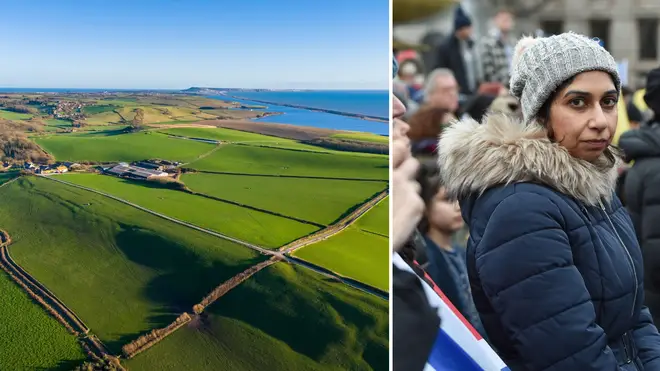
James O'Brien 10am - 1pm
13 February 2024, 07:57

Suella Braverman has said white people should not be made to feel guilty about their history after a wildlife charity said the countryside was influenced by ‘racist colonial legacies’.
Former home secretary Ms Braverman said that “just because there are more white people than non-white people somewhere does not make it racist.”
She was responding to charities who said the British countryside is a "racist and colonial" white space and people of colour are often framed as "out of place.”
“The UK is a majority white country, so of course there will be many areas where there is very little, and sometimes no, ethnic minority participation. I do not see a problem.
“Ethnic minority people tend to live in urban areas. Does that make Wembley, where I come from and which is now a majority non-white area, racist because there are fewer white people who live there? Of course not.”
She tweeted: “No, the countryside is not racist. Since my childhood, I’ve spent countless holidays camping, trekking, fruit-picking, orienteering & enjoying the British countryside. My ethnicity never posed a problem.
“More left-wing identity politics, victimhood & division. Not everything needs to be about race. The great thing about the UK is that people are welcome, if they have a positive attitude & respect others. Let’s keep it that way by focusing on character, not skin colour.
“And my top tips: other than the beautiful Hampshire countryside of the South Downs and New Forest, the Brecon Beacons is my absolute favourite. But reaching the summit of Glenshee was amazing too!”
The 'colonialism' claims were made by Wildlife and Countryside Link - a group of 80 organisations including WWF, the RSPCA and National Trust - while providing evidence to Parliament on connections between racism and climate change.
MPs were told that the countryside has been influenced by "racist colonial legacies", leading to an environment "dominated by white people".
The areas are governed by "white British cultural values", preventing people from other ethnic backgrounds from enjoying the outdoors, the report said.
It was submitted to MPs on the All-Party Parliamentary Group for Race and Community.

Nick Ferrari reacts to a report on climate change and racism
The report said: "Our policy recommendations ensure that all people have the right to a healthy natural environment – all people must have access to nature."
It added: "Racist colonial legacies continue to frame nature in the UK as a 'white space' and people of colour as 'out of place' in these spaces and environmental sector."
"Cultural barriers reflect that in the UK, it is white British cultural values that have been embedded into the design and management of green spaces and into society's expectations of how people should engage with them," it continued.
The report also suggests that there should be a "rights-based approach" to accessing green spaces, suggesting there be a "legally binding target for access to nature".
One proposal is ensuring everyone has a green space within a 15-minute walk from their home.
Head of Link Richard Benwell said: "Sadly, evidence shows that people of colour in the UK are more likely to live in areas with less green space and that are more heavily polluted, and at the same time they are significantly less likely to visit natural spaces.
"There are multiple complex reasons behind this, as well as contemporary well-documented experiences of racism people encounter.
"Access for all and addressing the barriers people face should be one of the guiding lights for all nature sites."

Ben Kentish challenges Keir Starmer's green energy U-turn
There are also broader claims in the report about the UK and climate change, stating: "The UK’s role in the European colonial project has also driven the current climate and nature crises."
It comes as the EU's climate service has revealed that global temperatures have pushed past the 1.5C warming threshold for an entire year for the first time.
World leaders pledged to limit the long-term temperature rise to 1.5C in the 2015 Paris Agreement, in a bid to avoid the most damaging impacts of global warming.
Scientists have said warming can still be slowed if countries step up their measures.